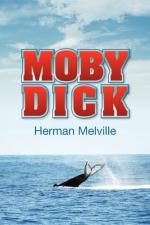|
|
Moby Dick Chapter 31 - 32
Chapter 31 - 32
Queen Mab/Cetology
The next morning, Stubb tells Flask of a dream he had that night, inspired by his conversation with Captain Ahab. In the dream, Ahab kicked him with his ivory leg, but when Stubb tried to kick him back, he was turned aside by a merman. The merman tells Stubb that it is an honor to be kicked by an ivory leg. Flask says this sounds like a foolish dream, and Stubb says it might be, but it's taught him never to approach Ahab.
Ahab shouts to the crew, "'Look sharp, all of ye! There are whales here-abouts! If ye see a white one, split your lungs for him!'" Chapter 31, pg. 108
It is difficult to make a classification of whales. A great number of men have attempted and failed; but the majority of these men have failed to actually ever see a whale, let alone study one. Ishmael divides them into three books: I. The Folio Whale; II. The Octavo Whale; III. The Duodecimo Whale.
In the Folio, there is the Sperm Whale, the Right Whale, the Fin Back Whale, the Hump-backed Whale, the Razor Back Whale, and the Sulphur Bottom Whale. The Sperm whale is the largest whale, and it's oil, called spermaceti, is the most valuable. The Right Whale was the first kind to be hunted by men, and from it men get whale-bone, and "whale-oil." The Fin Back can be distinguished by it's spout, and is smaller than the Right whale. The Humpback has a larger hump then the Sperm whale; little is known of the Razor Back whale; the Sulphur Bottom has a belly covered with barnacles.
In the Octavoes, there are the whales of less size: the Grampus, who breathes loudly, the Black Fish, which is known for its grin, the Narhwale, who has fine oil, but not very much of it, the Killer, with a savage disposition, and Thrasher, named for its tale.
Finally, there are porpoises of the Dudecimoes: the Huzza, the Algerine, and the Mealy-mouthed porpoise.
"But now I leave my cetological System standing thus unfinished, even as the great Cathedral of Cologne was left, with the crane still standing upon the top of the uncompleted tower. For small erections may be finished by their first architect; grand ones, true ones, ever leave the copestone to posterity. God keep me from ever completing anything. This whole book is but a draught- nay, but the draught of a draught. Oh, Time, Strength, Cash, and Patience!" Chapter 32, pg. 120




